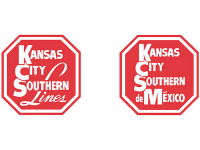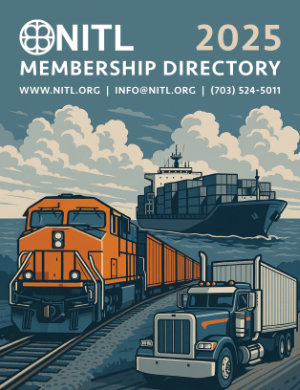On behalf of the National Industrial Transportation League (“NITL”), I am writing to you regarding significant concerns of our members regarding the new Container Excess Dwell fees recently adopted by the Ports of Los Angeles and Long Beach. These fees are intended to be assessed against ocean carriers, but some carriers intend to pass the fee through to their importer customers. The fee is designed to address the unprecedented congestion at the ports and to incentivize the prompt removal of loaded containers within the designated time-period.

Author Archive for NITL Staff – Page 9
Considering the extraordinary activity that we have been experiencing in the Ports of Los Angeles and Long Beach over the past 16 months and given that projections that show no reduction in volumes on the horizon, your recommendation that PierPass revert to an incentivizing program is a sensible one. Such a change can be expected to ease congestion during the peak hours, encourage off-peak use of the marine terminals by the trucking and shipping community, and bring the associated benefits not only to the cargo interests but also to the impacted local community.
DOT’s Notice requested information concerning important issues regarding the supply chain to assist the Department in preparing the report required by EO 14017. NITL strongly believes that the issues and recommendations identified in these comments filed on October 18, will further the administration’s policy of improving the freight transportation delivery network and the resiliency of U.S. company supply chains, thereby improving the economic activity that takes place in other sectors. Hence, NITL urges DOT to add the recommendations detailed in here to its supply chain report for the transportation industrial base.
Statement of the National Industrial Transportation League in Response to the STB First-Mile/Last-Mile Service Issues Decision
The National Industrial Transportation League, as the voice of the shipper, is enthusiastic that the Surface Transportation Board is taking up the issue of first-mile/last-mile, aka local switching service of the freight rail industry. We have long advocated that average train speed and terminal dwell, while important measures of railroads’ line haul service health, do not adequately measure the total supply chain impacts of freight rail service.
Railroads’ operational touch points with customers occur at the industries and the docks. Creating an industry standard for reporting on the first and final legs of rail movements will provide valuable insights to both the Board and rail customers regarding the impacts of rail transit on U.S. supply chains. This greater visibility into the challenges shippers/receivers face during localized rail service will provide data that will help industries plan and drive higher reliability and accountability of the freight rail providers’ common carrier obligations.
Nancy O’Liddy
Executive Director
National Industrial Transportation League
Coalition of Businesses, Trade Groups Endorse Ocean Shipping Reform Act
WASHINGTON, September 13, 2021 – A coalition of 152 companies and trade associations representing U.S. importers, exporters, transportation providers and other supply chain stakeholders today submitted a letter of support to Congress endorsing the Ocean Shipping Reform Act of 2021.
The bipartisan legislation was introduced last month by Congressmen John Garamendi and Dusty Johnson and would update the Shipping Act to recognize the significant changes to the international maritime transportation system of the past two decades. U.S. companies, their workers and consumers rely on a global maritime transportation system to support their businesses and move goods through the supply chain. The proposed legislation is essential to bring critically needed system improvements that have been further highlighted during the global pandemic.
Statements from policymakers and business stakeholders:
Congressman Dusty Johnson (R-SD): “Foreign ocean carriers aren’t playing fair, and American producers are paying the price. It’s time for updated rules of the road. That’s what our bill does.”
Congressman John Garamendi (D-CA): “Foreign businesses’ access to the American market and its consumers is a privilege, not a right. California’s agricultural exporters and other businesses are willing to pay to ensure that American-made products reach key markets in the Asia-Pacific. In turn, companies looking to offload foreign-made products at West Coast ports must provide opportunities for American exports. Even during a global pandemic, trade must be mutually beneficial, and that is exactly what our bipartisan bill ensures.”
David French, Senior Vice President of Government Relations, NRF: “The supply chain ecosystem is instrumental to American retailers’ ability to deliver products across the country to customers each day. Now is the time for the Shipping Act to be modernized to address a 21st century supply chain. We appreciate the efforts of Congressmen Garamendi and Johnson to address these complex challenges so many businesses currently face and encourage Congress to move fastidiously on this crucial legislation.”
Jennifer Hedrick, Executive Director, National Industrial Transportation League: “The National Industrial Transportation League is grateful to Congressmen Garamendi and Johnson for their recognition of the challenges that maritime exporters and importers are experiencing, and for their commitment to seeking practical and workable solutions to the myriad issues affecting the entire maritime shipping network. NITL provides its full endorsement of the Ocean Shipping Reform Act of 2021 and is pleased to see that it not only addresses current challenges, but also provides a framework for a more robust maritime supply chain for all stakeholders. NITL thanks Congressmen Garamendi and Johnson for their leadership in this area of significant importance to American businesses, consumers and the global economy.”
Peter Friedmann, Executive Director, Agriculture Transportation Coalition:
“Agriculture and forest products are our country’s largest ocean export. Yet, there is nothing we produce in ag/forest products that cannot be sourced elsewhere in the world. We are pleased that Congressmen Garamendi and Johnson and over 140 members of Congress recognize that unless U.S. agriculture exporters can deliver affordably and dependably, our foreign customers will shift to other global suppliers. The Agriculture Transportation Coalition and our members in all 50 states are committed to build broad House and Senate support for OSRA21, even as we seek and support Federal Maritime Commission intervention, and as we engage with ocean carriers, ports, terminals, labor and truckers to find and implement solutions.”
The coalition aims to continue building support for the bill and Congressional passage this year. The letter is accessible here.
About NITL:
The National Industrial Transportation League (NITL) is a trade association whose mission is to advance the views of shippers on industrial freight transportation issues and advance their professional development. NITL membership is comprised of companies engaged in the rail, maritime, and highway industrial freight transportation sectors who are committed to the competitive, efficient, and safe movement of goods across the United States and beyond.
June 3, 2021
1– 2pm EDT
The ongoing ocean shipping turmoil has wreaked havoc on US exporters and importers, costing them billions of dollars in higher shipping costs, demurrage and detention charges, and lost business, with still no clear end in sight.
The inability of US companies to timely access marine containers and chassis and secure sufficient vessel bookings to meet their business requirements has upended the ocean cargo shipping and delivery network. These unprecedented challenges have exposed gaps in the law governing ocean carrier services that warrant immediate action.
Join NITL for a webinar to discuss these challenges and review possible solutions through modifications to The Shipping Act of 1984, as proposed by NITL.
Featured Speakers:
- Lori Fellmer, Chair, NITL Ocean Committee
- Karyn Booth, NITL General Counsel; Partner, Thompson Hine Law Firm
- Randy Mullett, Senior Policy Advisor; NITL; Mullet Strategies
- Jennifer Hedrick, Executive Director, NITL
This session will conclude with a Q&A and we invite you to submit your questions in advance here.
Reserve your spot for this complimentary session today.
NITL Urges Congress to Adopt Shipping Act Reforms in Response to Unprecedented Disruption to the Ocean Shipping Network
The National Industrial Transportation League (NITL), the nation’s
oldest trade association representing industrial freight transportation shippers, is calling on Congress to modernize the Shipping Act of 1984 after months of congestion at U.S. seaports and unprecedented disruption to the ocean shipping network. Click here to view the Press Release.
January 13th – 2:00PM EST

This webinar will look at the impacts and benefits Positive Train Control (PTC) will have as currently implemented, and what the future could bring. You will receive a status update on PTC across the United States, including the Kansas City Southern rail networks.
The webinar will ask several key questions, and more, including:
What does it mean for PTC to “go live” in January 2021?
As a U.S. based regulation, how does PTC impact Canada and Mexico?
Where is the rail industry headed and how will PTC be leveraged?
Featured Speaker:
Doug Vogl,
VP Chief Technology Officer
Kansas City Southern Railway Company
You are invited to submit your questions in advance here.
Reserve your spot for this complimentary session!
Interested in learning about sponsorship opportunities? View our Sponsorship Prospectus.
Forecasting Trucking’s Future: Data-Driven Truckload Market Cycle
December 15 – 2pm EST

The Coyote Curve, a data-driven forecasting model based on the observed behaviour of shippers and carriers in the US freight market, is a proprietary index used by Coyote Logistics that uses years of market data and insight to measure the market capacity cycle. All shippers and carriers are impacted by the ebbs and flows of the market capacity cycle, but exactly how the market will impact your business varies based on a multitude of factors.
In this session, Coyote SVP of Yield Management Sean Fahey will give an overview of what the Coyote Curve is, how to utilize it in everyday decisions, and what it means moving into 2021. Register Now to participate in this complimentary session.
Interested in learning about sponsorship opportunities? View our Sponsorship Prospectus.
Transporting the COVID-19 Vaccine: Supply Chain Impact and Obstacles
November 19
11am – Noon EST
The COVID-19 Vaccine Distribution will be the World’s Greatest Logistical Feat- Learn about the Bottlenecks, Obstacles and Challenges from the Front Lines.
Regardless of your company’s involvement, your supply chain may be impacted. Don’t miss this important session.
The pandemic transformed global supply chains, tested their limits and has proven most to be highly resilient. Operation Warp Speed—the name given to the shipping of COVID-19 vaccine, in a cold/cool environment in the US, (and everywhere on earth), is an undertaking like no other before. Whether involved or not, this project will likely have several unintended consequences for shippers and service providers in our interconnected world. Join this panel as they explore challenges from the perspectives of a global package delivery provider, a healthcare freight forwarder, a temperature-controlled packaging supplier, and a healthcare and food trucking service provider. They’ll discuss the vaccine launch, and how it might lead to potential complexity in related and unrelated areas of the supply chain.
Featured Speakers:
Michael Haley, SkyCell
Lorant Kovacs, DB Schenker
Mary Tussing, United Airlines Cargo
Larry St. Onge, DHL
Jeff Tucker, Tucker Company Worldwide
Reserve your spot for this complimentary session!
Interested in learning about sponsorship opportunities? View our Sponsorship Prospectus.
MEMBERSHIP
Value to League Members
• Advocacy and Policy Development• Professional Networking
• Education and Information
NITL PARTNERS
The National Industrial Transportation League
10816 Town Center Boulevard, #516 Dunkirk, MD 20754-2708 • Phone: (703) 524-5011 • [email protected]


